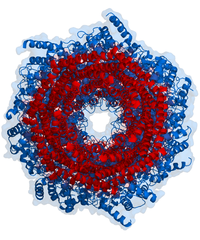
Photo from wikipedia
Several lines of evidence have shown that defects in the endo-lysosomal autophagy degradation pathway and the ubiquitin-proteasome system play a role in Alzheimer's Disease (AD) pathogenesis and pathophysiology. Early pathological… Click to show full abstract
Several lines of evidence have shown that defects in the endo-lysosomal autophagy degradation pathway and the ubiquitin-proteasome system play a role in Alzheimer's Disease (AD) pathogenesis and pathophysiology. Early pathological changes, such as marked enlargement of endosomal compartments, gradual accumulation of autophagic vacuoles (AVs) and lysosome dyshomeostasis, are well-recognized in AD. In addition to these pathological indicators, many genetic variants of key regulators in the endo-lysosomal autophagy networks and the ubiquitin-proteasome system have been found to be associated with AD. Furthermore, altered expression levels of key proteins in these pathways have been found in AD human brain tissues, primary cells and AD mouse models. In this review, we discuss potential disease mechanisms underlying the dysregulation of protein homeostasis governing systems. While the importance of two major protein degradation pathways in AD pathogenesis has been highlighted, targeted therapy at key components of these pathways has great potential in developing novel therapeutic interventions for AD. Future investigations are needed to define molecular mechanisms by which these complex regulatory systems become malfunctional at specific stages of AD development and progression, which will facilitate future development of novel therapeutic interventions. It is also critical to investigate all key components of the protein degradation pathways, both upstream and downstream, to improve our abilities to manipulate transport pathways with higher efficacy and less side effects.
Journal Title: Neuroscience Letters
Year Published: 2019
Link to full text (if available)
Share on Social Media: Sign Up to like & get
recommendations!